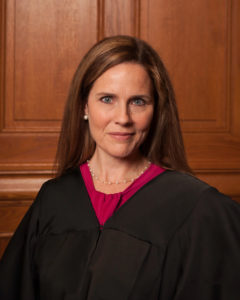No, Amy Coney Barrett Is Not a Humanist

The death of Ruth Bader Ginsburg last Friday left an enormously important vacancy to fill on the bench of the Supreme Court of the United States. Unfortunately, Donald Trump and the Republicans in the Senate have made it clear that they intend to announce a nominee to fill that vacancy tomorrow—despite the precedent they set in 2016 that no nominee should be considered while a presidential election is underway.
Most media reports suggest that the frontrunner for this nomination is Amy Coney Barrett. She was also considered a frontrunner for Anthony Kennedy’s seat when he retired, but that vacancy was instead filled by Brett Kavanaugh. At the time Trump apparently told people that he was “saving” Barrett for a possible Ginsburg vacancy.
Barrett is currently a judge on the 7th Circuit Court of Appeals in Chicago, nominated three years ago by Trump. Raised Catholic, she had a parochial-school education and graduated from Notre Dame Law School in South Bend, Indiana, where she taught law for fifteen years and where she still lives with her husband and their seven children. Before she became a professor, she clerked for conservative Supreme Court Justice Antonin Scalia and then practiced law at private firms for two years. At Notre Dame she was a member of the Federalist Society, a conservative legal advocacy group.
If she is in fact nominated, the forty-eight-year-old Barrett would be the youngest justice on the Supreme Court, likely to help shape the court for decades. And her successful appointment threatens many issues that humanists value including, most centrally, the separation of church and state.
Her nomination hearing to the circuit court was contentious, especially concerning her previous writings which offer evidence that she doesn’t believe in separation of church and state and that her Catholic faith would influence her decisions as a judge. After quoting from articles and speeches by Barrett, Senator Dianne Feinstein (D-CA) addressed her and said they showed “a long history of believing that religious beliefs should prevail….the conclusion one draws is that the dogma lives loudly within you. And that’s of concern when you come to big issues that large numbers of people have fought for years in this country.”
According to the Associated Press, her short judicial career “includes the authorship of around 100 opinions and several telling dissents in which Barrett displayed her clear and consistent conservative bent.” These opinions include dissents that supported limiting states’ ability to make gun control laws and another supporting Trump administration immigration barriers. As a judge, Barrett has also twice joined complicated dissents that would allow states to limit a woman’s right to an abortion.
Critics are particularly concerned about decisions Barrett may make on issues including reproductive rights, LGBTQ+ rights, and discrimination on the basis of religion—all of which are already scheduled or are likely to come before the Supreme Court in the near future.
If nominated and approved, Barrett would be the sixth Catholic on the high court. Two justices—Stephen Breyer and Elena Kagan—are Jewish, and Neil Gorsuch is an Episcopalian who was raised Catholic. The five remaining justices are all Catholic. In Barrett’s case, it is particularly concerning that both she and her husband are reported to be members of a group called People of Praise, which the New York Times reported “grew out of the Catholic charismatic renewal movement that began in the late 1960s and adopted Pentecostal practices such as speaking in tongues, belief in prophecy and divine healing.”
The group gained notoriety during Barrett’s 2017 hearings when it was reported that People of Praise teaches that husbands should have the authority as heads of the household, with men in the group called “heads” while women were termed “handmaidens.” Comparisons were immediately drawn to Margaret Atwood’s dystopian novel The Handmaids Tale.
Although nothing with Trump is a sure thing, he has stated that he will nominate a woman to fill Ginsburg’s seat. Even assuming that he follows through with that, it should be noted that Barrett is not the only contender. Other women in the running include: Barbara Lagoa, fifty-two, a Cuban-American judge from Florida (a state Trump needs to carry in the election) who currently sits on the 11th Circuit Court of Appeals; Joan Larson, fifty-one, of the 6th Circuit Court; Alison Jones Rushing, thirty-eight, recently appointed to sit on the 4th Circuit; and Kate Comerford Todd, forty-five, who is a deputy White House counsel and has never been a judge. (Again, the age of a Supreme Court nominee is relevant given the lifetime appointment.)
Each of these choices would cement the conservative bent of the current bench, and, as all are relatively young, they would ensure a conservative court for generations.
